#tim bevan
Text

I watched Nye, in February, in London. I am French so I knew I need a little more time to process everything so I read and learn all I can about Aneurin Beuvan (or at least what I had the time to read because you need to work to make a living...). And Aneurin... Wow ! Aneurin was incredible. The more I learned about him, the more I learned about Michael and about Wales too. Michael Sheen has strange side effects XD
Before the play I was teased by everyone tweets saying how much they cried XD
I thought I wouldn't.
The play in itself was gold. I must admit I didn't understand every joke. I don't have the cultural background yet but I knew they were joking at politicals XD
There are scenes that will stay in my mind forever.
The young Nye stunned by the library and the possibility to read books for free. To learn. It talks to me so much because I was like that when I was little. Fascinated by those portable worlds that learn you so much.
Nye, witnessing the violence of poverty.
Churchill, played by Tony Jayawardena gave me so many chills ! He was impressive, and he scared me. He only has to step in and you already know who he is. The bombing scene was terrifying.
Jennie Lee, played by Sharon Small who I already saw in Good, oh what a pleasure it was to see her !
Nye, submitting to Jennie the alpha male... Oh I laugh so much and I'm still laughing !
And the song... Don't forget the song ! But I want Lee Mengo's version, who also played Nye, for science, obviously.
Oh, there is so much scenes. The mine ! What a clever setting !
I could talk about it for hours !
I didn't cry. I was like "OH I survived :D :D"
Then in the end I understood.
What Nye was fighting for... We are losing it, pieces by pieces. In England. In France.
When Nye asked "Did I take care of everyone ?" (oh gosh I'm crying), the answer is yes and still today... Without our french NHS, I wouldn't be alive. I have asthma. I had severe asthma when I was younger and needed emergency care.
Nye saw the humans behind the numbers.
Nye talked about us. About poverty. About dignity.
And we are loosing all he (and the others) did today. And it make me feel so much rage !
1 note
·
View note
Text
Arkham Abyss Files: Robin_MEMORY_01
Loading FILE...
JASON TODD: AGE, 16
TIM DRAKE: AGE, 15
Tim was used to the collective cesspool of niceties that Gotham elite kids were, but the new kid wasn’t. Tim felt for him, but so far hadn’t tried to approach him, not for fear of being targeted alongside the new kid –he already was targeted for being a year ahead–, but because it was exams season. And that he was Bruce Wayne’s new protegee… He had nothing against the Waynes, but they had a reputation for being wild and troublesome.
It wasn’t because of what he read on the news, of course, he’d seen it firsthand in one of the many parties he’d been forced to attend with his father or in his stead. Tim winced at the memory of Mr. Wayne jumping into a fountain with some models or something, calling Gale Patricks a pussy in many other words, gifting a giraffe to one old lady whose name he didn’t remember right now and that had died two months ago… The point was, Wayne and Eccentric came hand in hand. His previous ward had done some rather dubious things as well, but nothing as flashy as his protector.
But this kid—he didn’t seem to be like that at all. Tim had read the article that detailed some of his background, if it could be believed of course. But for the few weeks he’d seen him, Tim knew that it was probably right. So now as all the kids were milling through the doors and into the yard of the Robinson Academy, there were the five bullies, some a year or two older as they had repeated a year or were just about to graduate–which usually made them more eager to harras and being a nuisance, as if this was their last chance of making miserable someone else. The thing was, the Wayne kid wasn’t taking their harassment as meekly or frightened as they’d been expecting, in fact, he was showing no sign of anything but annoyance, so they’d gotten ticked off.
Tim paused, he shouldn’t get himself involved as long as things didn’t escalate—
Of course, Gavin Bevan would take Wayne’s backpack and turn it upside down, spilling everything on the floor. Some other kids froze as well, waiting to see what would happen next. Tim was sure the bullies were about to meet their maker by the murderous look the Wayne kid shot them, and Tim had seen that kid’s strength at basketball, he was just built differently. Even if they were five against one—maybe he wouldn’t win, but he’d give a hell of a ride to his opponents.
But then Wayne took in a breath and relaxed his shoulders, then said something that dissuaded the bullies from taking things further. They laughed mockingly, said some other pejoratives kicked lightly some of his stuff around then left.
Tim walked over as Wayne started gathering his things around and the rest of the students moved again, disappointed nothing interesting had happened. He helped him gather his books and other stuff.
“Thanks,” Wayne said gruffly.
“No problem… I’m Tim Drake by the way.”
“Jason Todd,” The other answered as both straightened and started to walk in.
“So—you’re good at basketball.” Tim couldn’t think of anything else to say, besides, they both were on the team, even if they hadn’t talked at all before now.
“You’re not so bad yourself. Though you’re a bit short.”
“I’m a year younger,” Tim defended.
“Another year skipper? Figures…” Jason muttered.
“Who else skipped a year?”
“An annoying cat. But you’re not as bad as her,” Jason explained, not very illuminating.
“Thanks, I guess?”
Jason grunted and smiled shortly.
“Want to eat lunch together?” Tim asked, because why not.
“Sure. That way we’ll make those idiots happy to pick on us both at the same time.”
“I like efficiency.” Tim shrugged.
Jason huffed, “That’s one way to put it shorty.”
“I already said I’m younger,” Tim complained.
END OF MEMORY...
For more FILES check previous entries...
#arkham abyss (fanfic)#arkham knight#arkhamverse#batman#jason todd#tim drake#fanfic#jason and tim were friends#then everything changed when the fire nation attacked#well when arkham happened#dc
27 notes
·
View notes
Text
“If It’s Not Grueling, It’s Not Worth It”: John
Cale, in Conversation With Michael Sheen
Michael Sheen heard John Cale’s singular voice for the first time as a teenager in his bedroom in Port Talbot, Wales. “Someone cool must have given it to me,” he says of listening to White Light, White Heat for the first time. “I knew nothing about The Velvet Underground, I knew nothing about anything… Then I hear this voice on the song, ‘The Gift,’ and I’m like, ‘Hang on, that’s a Welsh voice.’” On his eighteenth studio album, POPtical Illusion, Cale, now 82 years old, is still possessed of that distinct, boundless instrument. Its emotional tenor, as Cale points out, is “snide,” and throughout the record, there’s an air of humor but also repressed rage boiling just beneath its poppy surface. The legendary musician wrote most of the album during the first Covid lockdown, averaging three songs a day. “I was really angry,” he told Sheen on a call earlier this month. “But I didn’t want the anger to really predominate.” To celebrate the release of Cale’s new album, the two Welshman delved into their respective creative processes, Cale’s relationships with Lou Reed and David Bowie, and the transformative power of public libraries.
MICHAEL SHEEN: How are you?
JOHN CALE: I’m good. I’m just delivering an album.
SHEEN: I’ve been thoroughly enjoying listening to it.
CALE: Oh, really?
SHEEN: Yes, they sent me a link.
CALE: That’s good.
SHEEN: It’s absolutely beautiful, John.
CALE: Good. Well, are you in Port Talbot?
SHEEN: I was in Port Talbot until the weekend. I’m in London for a little bit now. I’ve just finished doing a play. I’ve been playing Nye Bevan.
CALE: Oh, that’s great.
SHEEN: For the last three or four months, we’ve been at the National Theater here in London. Then we did a couple of weeks in Cardiff at the Millennium Center last weekend.
CALE: Who wrote the play?
SHEEN: Tim Price, the Welsh writer. It’s a new play directed by Rufus Norris.
CALE: Very good. Glad to hear you moving on. I’m trying to remember a photograph of him when I was growing up in Garnant and he was a political heavyweight.
SHEEN: Oh, yeah. He’d started off working down the mines. He was a draft door boy.
CALE: That’s right.
SHEEN: Both of you had fathers who were miners.
CALE: Yes. My dad was a fitter. You know what a fitter is?
SHEEN: No.
CALE: A fitter is a guy who goes in and puts the wrenches and the bolts and everything together. He doesn’t go down shoveling coal or any of that. He just puts gear together.
SHEEN: Well, it’s funny, because listening to the album, I was reminded of a scene in Nye, where you see Bevan as a young boy going into the Tredegar Library. He had a terrible stutter, a stammer. The library gave him the opportunity to increase his vocabulary so he could use different words. Literally, libraries gave him power.
CALE: Listen, the library in Garnant gave me power. It was a little place stuffed with books, but they have these cards where, if you wanted a book that they didn’t have, you could fill out the form and they’d run off and get it. And not only that, they filled out forms for music. The music was attended to by the Marlborough-MA Public Library. If I put down Schoenberg, they would find the book.
SHEEN: Wow, that’s amazing.
CALE: I learned so much from that.
SHEEN: One of the most moving scenes in the play is this scene in the library because, of course, it gives Bevan his freedom. He’s able to talk. And on your new album, a line that really jumped out at me was on “Company Commander,” when you say “right-wingers burning their libraries down.” You think, “Here are the things that gave the working class in Wales power and now we’ve got people, as you describe, burning the libraries down.”
CALE: As a social activist, I’ve watched you approach that subject not just carefully, but penetratingly
SHEEN: Well, that line really jumped out at me. And I think the album is beautiful, disquieting, but I also found it incredibly moving at times.
CALE: Really?
SHEEN: Well, just seeing a song called “Davies in Wales,” immediately my ears pricked up, especially knowing that your name is John Davies Cale. I’ve listened to that a few times today. What was going on there?
CALE: It’s a laugh. You’ve got to have some of that in your life otherwise you’d die of boredom. “Shark-Shark” was one that really doesn’t have any sense to it at all. You just do it as a goof.
SHEEN: Am I right in saying that the very last word on the album is coal?
CALE: Code.
SHEEN: Code, right. See, my Welsh ears heard coal because I couldn’t help but be tempted into thinking of you floating down a river like a magical piece of coal, John. Is it too late to change it to coal?
CALE: For you? No.
SHEEN: But am I right as well in saying that in the space of a year you wrote over 80 songs and that this album has come out of that?
CALE: Yeah. The lockdown took over about a year-and-a-half ago and I just shut the door and took precautions and got on with some work. When I came out of that, there was an album already. At the end of the day, I had 80 songs. This is about finding poetry in the strangest places.
SHEEN: Did the lockdown color the nature of the songs in terms of their tone?
CALE: Yeah, I had a lot of energy. I was really angry. I didn’t want the anger to really predominate. It was really about trying to find out what else there was around you that you considered as part of your persona. If you’re writing lyrics, you start with a lyric and then you go to the music. Or you start with the music, then go to the lyrics. You really don’t want to obey too many of the laws of poetry and rhyme too much. You don’t mind tripping over your own shoelaces. Making mistakes is really important sometimes, and I’m still growing.
SHEEN: Have you carried on writing at that kind of pace since then?
CALE: Yeah.
SHEEN: Wow. That’s an extraordinary creative explosion. Is that just to do with the lockdown conditions or is it also where you were at in your life?
CALE: I think so, yeah. I’ve had enough of certain things. But the whole process welcomed me like, “Hey, why don’t you do this?” You find the rest of your ideas by rifling around all the ideas you’ve had to the beginning of that lockdown and eventually, you don’t have a lockdown.
SHEEN: Well, it clearly wasn’t a kind of creative or imaginative lockdown. Did you know they were always going to be for a solo album?
CALE: No, the collaborations happened on the first of the albums. The rest of it was just me playing with my instruments. I just had a pile of instruments in my studio and off I went.
SHEEN: But this album feels so crafted and so textured. It’s interesting you said that you were very angry because maybe that’s one of the “poptical illusions” of the album, because it doesn’t immediately feel like an angry album. It feels incredibly lush. Even at its most lush, it’s never comfortable. There’s always disquiet there. My hearing is getting worse, and I’ve never been able to hear lyrics very well, so I have to listen over and over to get to the lyrics. As I listened to the songs more and more, you do start to hear the anger. It’s so rich and lush and textured and yet there is a darkness in there as there always is in your work, John.
CALE: Yeah, I appreciate that. “Snide” is an appropriate word.
SHEEN: It’s a good word.
CALE: It’s handy.
SHEEN: We were at a very particular time when we were in those lockdowns. You start to think about the western world over the last 10 years or so, and not only were we in that bizarre situation of being locked up in our homes, but we were also at a time in the world where things were and still are obviously unhinged in all kinds of ways. Is that what was feeding that sense of anger that you were talking about?
CALE: Well, people don’t want to be lectured. You don’t want to say anything because then you’ve got the responsibility of answering the questions. You want to see if you can get away with as much humor as you possibly can.
SHEEN: That’s where snide comes in.
CALE: It’s a good to have a sense of humor with some snide.
SHEEN: Well, it’s funny you talk about your sense of humor. The very first time I heard your voice, I was a young teenager in my bedroom in Port Talbot. I had my first record player. My musical tastes were fairly conservative when I was younger. But somehow I’d got hold of White Light, White Heat. An older cousin must have given it to me or something. Someone cool must have given it to me. I put it on and I’m listening to this album and it seemed like the epitome of the exotic for me. It’s American, it’s the coolest thing ever. I knew nothing about Velvet Underground. I knew nothing about anything, really. Then I hear this voice on the song “The Gift”, and I’m like, “Hang on, that’s a Welsh voice!” I couldn’t believe it. That’s when I discovered you and who you were and where you’d come from and all that kind of stuff. But that dark humor, that was my first introduction to you and dark humor itself.
CALE: When we did that album, people were wondering, “What is this about? What are these guys doing?” I thought to myself, “I have to wait until the end of the album to have a clear idea of where I stood in the European world and where I did not stand in the European world.” Most of the songs on a lot of those albums were reflections of what I was missing about Europe. Those were a lot of loose songs, granted, but a lot of the songs I came up with at the end of that period, like “Paris 1919,” for instance, were written from California.
SHEEN: When you were in New York in the ’60s, did you feel like a European in America?
CALE: I did, but I didn’t have time for it. It’s a weird position to be in. You’re sitting in New York and you’re hanging out with Andy [Warhol] and the factory and all those other characters, all just amazingly brilliant in their own way and full of ideas and kind and gentle. It was a nonstop fountain of inspiration. What am I trying to say? It was an artistic revolution in New York. A lot of it probably came from the sexual revolution that was going on. There was so much of that going on. I was really interested in a very specific kind of music that happened to have been started in 1963 in Stockhausen. But all of a sudden, I was with LaMonte Young in California, where he was a jazz saxophone player. He was moving to New York and he was interested in totally different things about drones. He took that influence with him across the water. Then Viola Monte Young starts introducing droned violas to the Velvet Underground and we have modern music, essentially.
SHEEN: Part of your extraordinary career has been about connecting and working with younger artists coming up, whether it’s The Stooges or The Modern Lovers, right up to Kelly Lee Owens and Nirvana. How do you stay plugged into that? How do you watch out for what’s going on and see who you want to work with?
CALE: It’s pretty easy. It’s all over. With the new technology, you can’t avoid it.
SHEEN: But if you’re writing songs, how have you got time to listen to other people’s music as well?
CALE: That’s one of the problems. It’s just one of those things that you run into in life. You can’t do it all the time. You can’t do it for very long. But it’s just knowing what’s going on, where and when. But the other stuff is, I can just keep going. I’m not fragile yet.
SHEEN: No, you don’t seem fragile in any way, John. Although I have to say, in some of the lyrics and some of the music on this album, there’s a vulnerability there.
CALE: An important characteristic of your creativity is how fragile you are in the process. You reveal more of yourself in that way. I think revealing more of yourself has no limit. I think it’s something you’ve got to recognize in the process.
SHEEN: I was talking about this recently, but when I was a younger actor, I thought good acting was essentially about showing off. I thought it was about working out how to be really entertaining and clever and funny and smart. Then, as I got older, I realized that the more uncomfortable I was when I was acting, that’s actually where the good stuff is.
CALE: Yes, absolutely.
SHEEN: That’s where the magical pieces of coal are.
CALE: Don’t tell anybody.
SHEEN: So a lot of people came out of lockdown having watched a lot of box sets on TV. You came out of it with multiple albums and god knows how many songs. I don’t know about this album, but certainly on the last album, you have a song like “Night Crawling” where you’re going back over stuff with David Bowie. Was there a lot of that happening in lockdown as well? I don’t mean reminiscing in a nostalgic or sentimental way, but a sense of drawing from the past?
CALE: Only when I wrote the song. It was something that happened. I was a little embarrassed about having to have a character in my songs that you can really appreciate for other reasons. I was trying to be kind and generous about it.
SHEEN: You’re bound to be aware. If you are writing a song about something that’s happened to you, and it involves someone that everybody knows, there is an awareness of the weight of that, isn’t there?
CALE: Yeah. You try to be generous with everybody.
SHEEN: If it involves going back to working with Lou Reed and everyone else, do you feel a need to make it slightly more cryptic?
CALE: That happened already. That’s part of history. I dealt with it and I’m satisfied with it. I’m glad that we wrote Lou’s Drella together. When we finished the whole piece, I said, “Lou, we’ve written all these songs and they’re all about all these characters that we know and we love and lived through. But you didn’t write a single verse about the Velvet Underground.” He went away and wrote one and came back.
SHEEN: Well, I suppose it’s difficult. If you’ve lived a life like you have lived and you’ve been around the people, it’s going to be difficult to write any song without somehow involving people that everyone knows in some way or another. Do you remember when I came to New York and when there was that exhibition about the Velvet Underground?
CALE: Yes, that’s right.
SHEEN: You were surrounded by people the whole time, so I didn’t want to bother you too much. But before I left, I wanted to come up and say hello. As I was with you, Laurie Anderson came up to us and I totally embarrassed myself by suddenly going, “Oh, ‘Superman’ was such an amazing song for me.”
CALE: She deserves it.
SHEEN: She quite rightfully paid me no heed and walked off.
CALE: Really? I’m surprised.
SHEEN: I felt so embarrassed.
CALE: No, she’s a kind soul. I’m glad you did it.
SHEEN: More and more now, actually, I feel like I want to tell people when they’ve had an amazing effect on my life. There’s so much shit in the world. There’s so much stuff that makes you feel shitty. And that’s another reason why I find listening to your new album moving, because you are one of those people for me. Are you going to be touring this album?
CALE: Yeah. It’s starting in January. I’m doing a couple of gigs in Mexico. It’ll be interesting now that they’ve got a new Prime Minister.
SHEEN: Indeed. Touring and playing live, is that something that has become more important to you, or maybe less?
CALE: Oh, it’s always been important. It’s been like a life-giving source. You get an audience out there. There’s nothing better than that.
SHEEN: Is it grueling?
CALE: If it’s not grueling, it’s not worth it.
21 notes
·
View notes
Text
Cats Footlight Production 2008
I do so love stumbling across a new non-replica of my favorite musical.
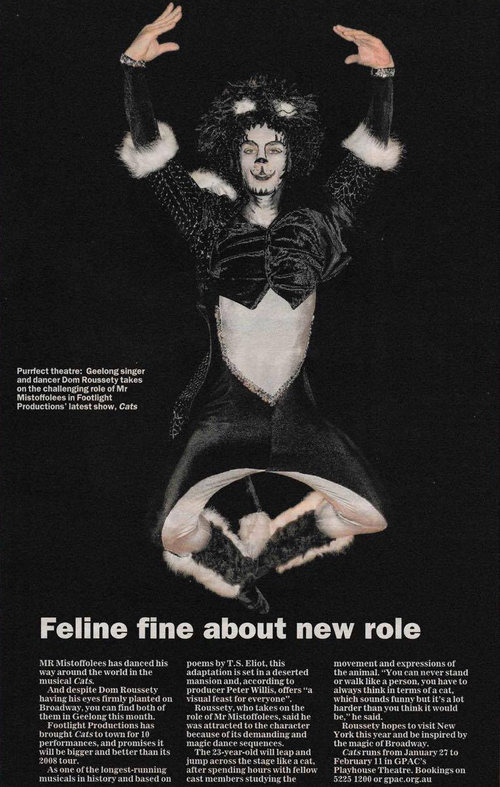
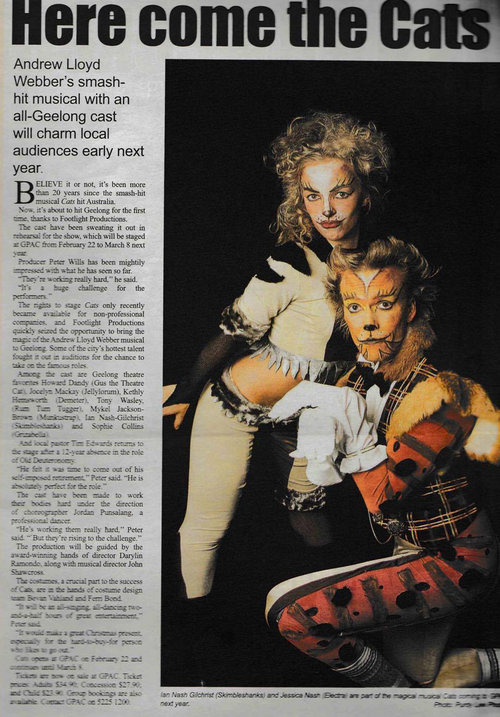
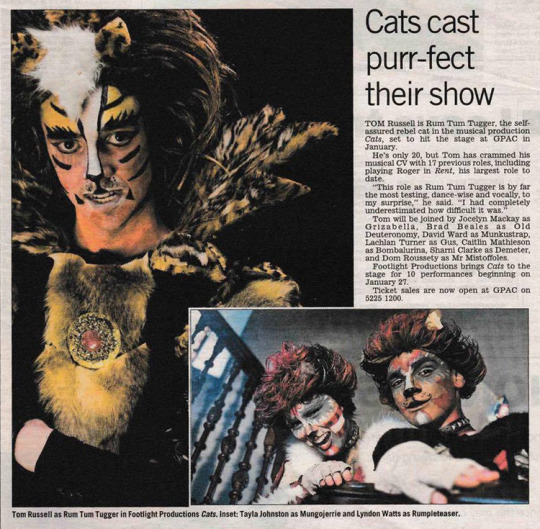
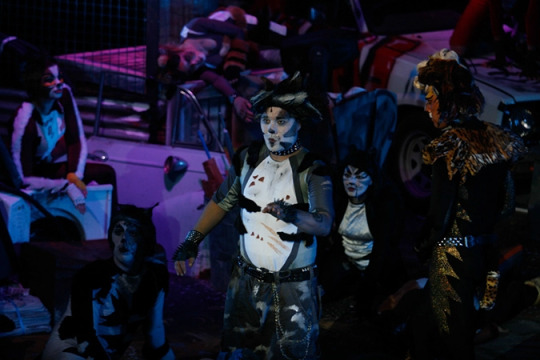
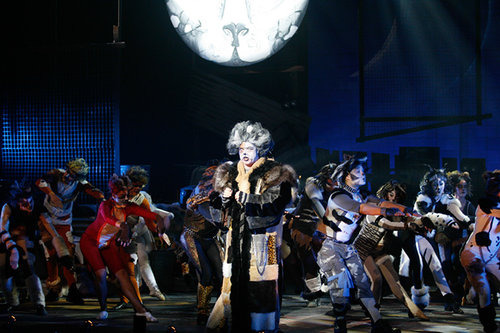
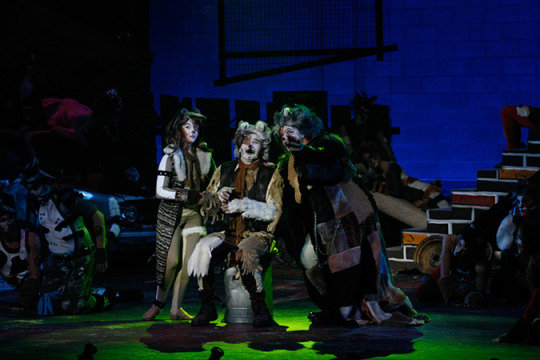
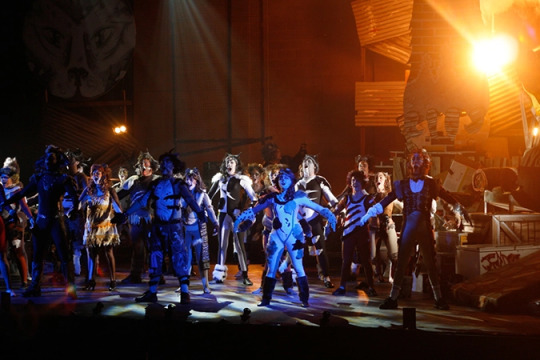

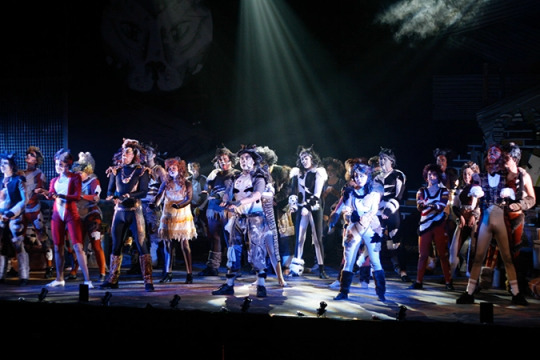
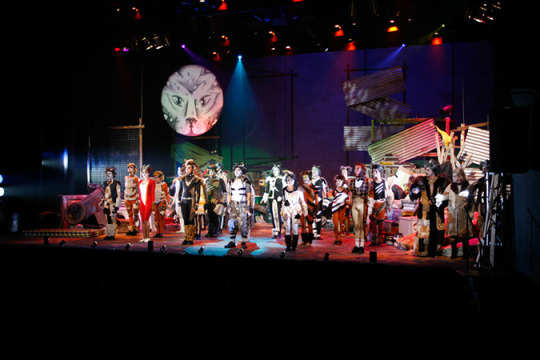
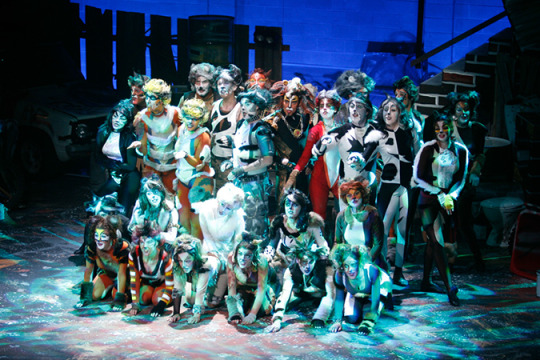


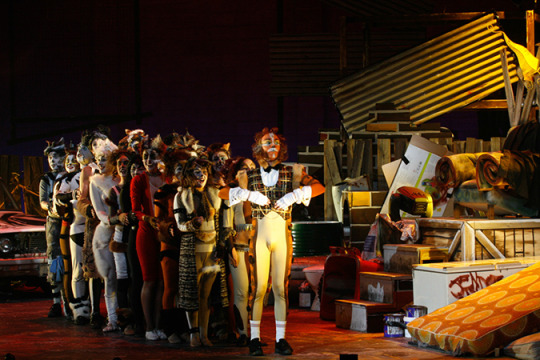
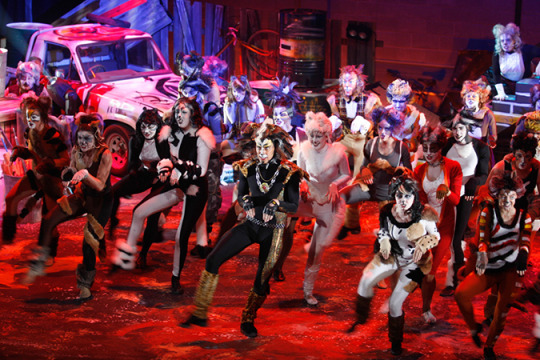

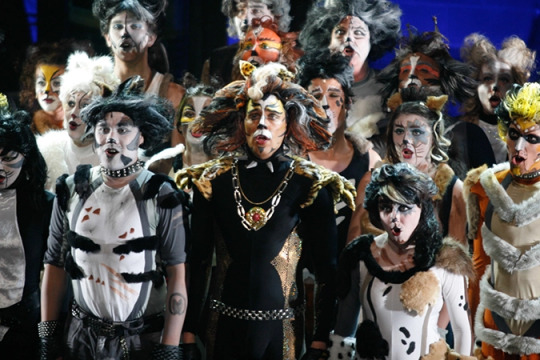
It apparently took place from January 27 to Febuary 11 2008 in Geelong (I think in Ausralia?) according to one of the above articles.
@whitmerule @cryptidvoidwritings @statisticalcats2
Cast and Production team list below the cut
PRODUCTION TEAM
Producer Peter Wills
Director Darylin Ramondo
Musical Director John Shawcross
Vocal Director Anita Barlow – Burman
Choreographer Jordan Punsalang
Costume Design Bevan Vahland
Costumes created by Ferri Bond
Make Up Design Penni Nash-Gilchrist
Set Design Bevan Vahland
Lighting Design Shane Haugh
Stage & Technical Manager Robert McKenzie
CAST
Admetus Olivia Taravillo
Alonzo Glenn Murray
Angelica Caitlin Mathieson
Bombalurina Amy Lehpamer
Bustopher Jones Lachy Joyce
Cassandra Bree Moyes
Coricopat Jordan Middelkoop
Demeter Kethly Hemsworth
Electra Jessica Nash
Etcetra Zoe Marsh
Exotica Jess Gomularz
Grizabella Sophie Collins
Gus The Theatre Cat Howard Dandy
Jellylorum Jocelyn Mackay
Jemima Emily Jacker
Jennyanydots Gail Lee
Mr. Mistoffelees Casey Chisholm
Mungojerrie / Macavity Joel Cooper
Munkustrap Mykel Jackson-Brown
Old Deuteronomy Tim Edwards
Plato David Greenwood
Pouncival Caleb Vines
Rumpleteazer Jennifer Stirk
Rum Tum Tugger Tony Wasley
Sillabub Nikki Lenaghan
Skimbleshanks Ian Nash – Gilchrist
Tantomile Farryn Burrill
Victoria Purdey Rickard
32 notes
·
View notes
Text

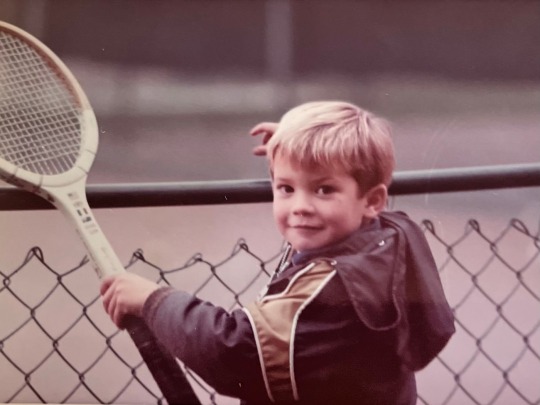
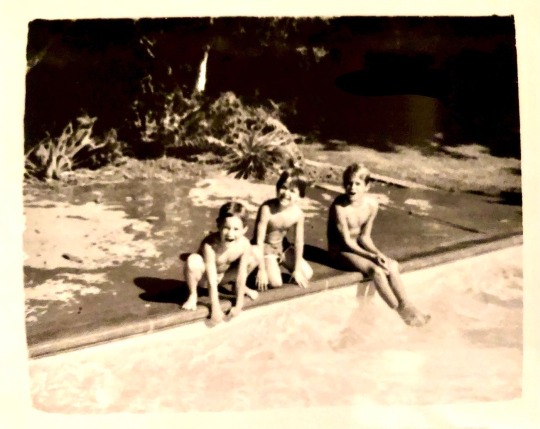
Timothy Olyphant, 55, is an actor who starred in Deadwood, Live Free or Die Hard, and Justified. He will star in the FX miniseries Justified: City Primeval this fall and currently co-stars in the Max miniseries Full Circle. He spoke with Marc Myers before the actors strike.
TIMOTHY:
You couldn’t get me out of the pool when I was a kid. We lived next door to a swim and racket club in Modesto, Calif.
I began regular swim practice at age 6. My older brother, Andy, took to tennis, which probably helped us get along. We were competitive. Our younger brother, Matt, did a little bit of everything and eventually became a water-polo player.
I was born in Hawaii, but we moved to Modesto when I was 3. My dad, Bevan, worked for Del Monte and left to work at E&J Gallo Winery soon after we relocated to California. He started in bottling and worked his way up to vice president of production.
My mom, Katherine, was a full-time mom. She was the nurturing type. Whether I won or lost, she’d always talk about how well I competed or how beautiful a swimmer I was, never about whether I won or not. She’s very sweet and encouraging.
Just as I was starting high school, my parents divorced. After they split up, we quickly figured out who was responsible for what. For example, our dad didn’t really know how to do laundry or cook. If we were going over to his place, we’d probably be eating out.
When you’re young, any time your foundation gets rocked, it sets you back a bit. I’d been a good student when my parents were together, but there definitely was a dip after the divorce. I kind of saw what I could get away with and wound up just an okay student.
I wasn’t in school plays. I’m not sure I saw that side of me yet. Instead, I was at swim practice and hanging with my buddies. I also liked to draw a lot, which I suppose is how I expressed myself.
I was a solid swimmer in the Central Valley. I set a CIF SAC-Joaquin Section Record and wound up with an All America Swimming Certificate. By my senior year, I realized swimming was my ticket out of town and certainly the only way I’d get into a great university.
I worked hard. After USC saw the times I was posting, they called to recruit me for the team. When I flew out to USC on my recruit trip, I met with the dean of the architecture school. He said there was no way I could manage both the swim team’s practice schedule and the rigors of the architectural program.
I asked him about the art gallery downstairs. He said it was part of the fine-arts department. I didn’t even know you could get a degree in that. I met with the fine-arts dean and asked if I could be on the swim team. He said we’d work it out.
Majoring in fine arts for me was like winning the lottery. In high school, I’d get in trouble for drawing when I was supposed to be doing schoolwork. Now, in college, drawing was my schoolwork.
After my senior year, I left USC several electives shy of a degree and didn’t finish until the pandemic. But before I left, I met some drama majors who got me thinking about acting.
By then, my college girlfriend, Alexis, and I had married. We moved to Seal Beach, south of Los Angeles, where I coached swimming. To fulfill some of my electives I took an acting 101 class at UC Irvine. I had a ball. It was a language I understood immediately.
I read Stanislavsky’s and Sandy Meisner’s books on acting. I realized that it wasn’t a frivolous pursuit but a craft on par with how artists I admired approached painting and sculpture. I told Alexis I was thinking about pursuing acting rather than a master’s in fine art. She said, “Tim, just do something. Just pick one thing and do that.”
The guy who taught the intro class was a graduate student who recommended I study with Bill Esper at the Esper Studio in New York. Fortunately, Alexis’s dad lived there and let us move into his place.
My career has been many little steps—a lot of one step forward, two steps back. I’m not sure if there was any one role that really changed things, but landing the lead in “Justified,” in 2010, certainly helped things along.
Today, Alexis and I live in Los Angeles and have three grown kids. We moved in 15 years ago and love the house and neighborhood. I still draw and swim.
Breakfast is my favorite meal. I make steel-cut oatmeal in my rice cooker, which has a porridge setting. When I come home from swimming and have my oatmeal, I feel like I’m 8 again. And you know what? That feels pretty good.
—————
Timothy’s Digs:
Full Circle? I play Derek in the miniseries about a kidnapping gone awry and the family secrets exposed.
Blissful space? Sitting in a blue chair in the kitchen having coffee with my wife.
Cool buy? A painting by an artist I’ve admired for at least a decade or so.
Tennis? I play with my brother and oldest daughter. The fact that they play with me means the world.
Youngest daughter? Vivian. She’s an actress in the coming season of Justified: City Primeval.
64 notes
·
View notes
Note
How dumb am I that until like a minute ago I thought Nye was just short for New Year's Eve and thought it was one of those holiday themed show and not the actual name of the character.
I do think this one is on Tim Price (the author) when he could have just named it Bevan
14 notes
·
View notes
Text
'The film centres on the crucial hours leading up to the Normandy landings.
Filming begins today, 9 September on Pressure, a new WWII drama starring Andrew Scott.
Adapted from David Haig’s stage play, the feature centres on the crucial decision-making behind the D-Day landings, as Britain’s chief meteorological officer James Stagg (Scott) must deliver the most portentous forecast in history, ensuring the success – or not – of the planned seaborne invasion.
Stagg enters a tense standoff with the Allied leadership, whereupon the final decision rests with Supreme Allied Commander Dwight D. Eisenhower, played by Brendan Fraser.
Anthony Maras is in the director’s chair, calling the shots from a screenplay he wrote with Haig. Eric Fellner and Tim Bevan produce for Working Title Films; it is a co-production with StudioCanal.
Working Title is busy as ever with a slate including Johnny English 4, due to shoot in the UK and Malta, and CC: Emily, a feature now filming in Manchester directed by Alicia MacDonald.
Scott is coming off filming his role in Wake Up Dead Man – the third Knives Out film – that recently completed a UK shoot, starring Daniel Craig.'
#Andrew Scott#Pressure#Brendan Fraser#Wake Up Dead Man: A Knives Out Mystery#James Stagg#Anthony Maras#David Haig#Dwight D. Eisenhower
3 notes
·
View notes
Text
In the Olivier theatre, Tim Price’s new play, Nye, will play from 24 February - 11 May, directed by Rufus Norris, which charts the life of Aneurin 'Nye' Bevan.
From campaigning at the coalfield to leading the battle to create the NHS, Nye Bevan is often referred to as the politician with greatest influence on our country without ever being Prime Minister. Michael Sheen (Under Milk Wood) will play Nye Bevan in this surreal and spectacular journey through the life and legacy of the man who transformed Britain’s welfare state.
Nye will also play at the Wales Millennium Centre from 18 May-1 June, with Michael Sheen continuing his role as Nye Bevan.
11 notes
·
View notes
Text


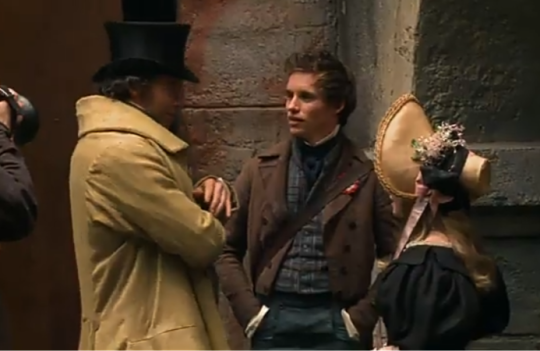

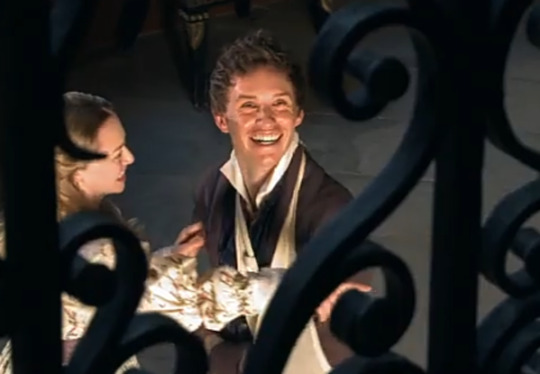


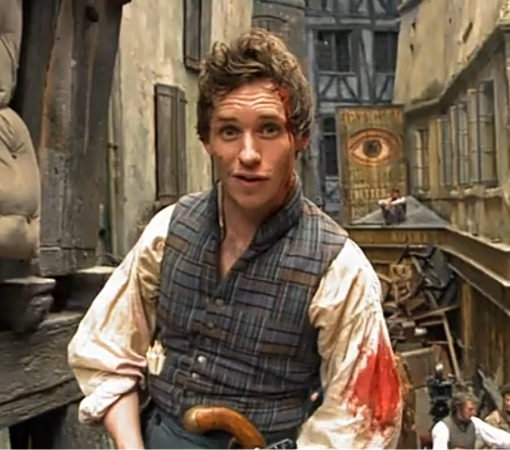
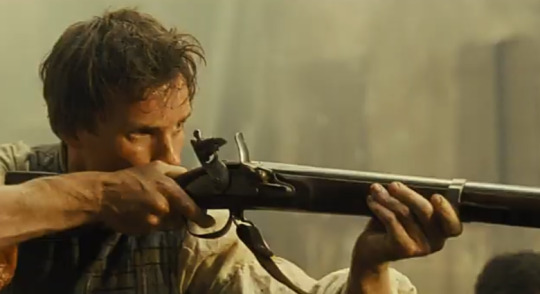

Les Miserables (2012) - Behind the scenes.
🎥 Video posted by Cinema Scope on YouTube
Les Misérables is a 2012 epic period musical film directed by Tom Hooper from a screenplay by William Nicholson, Alain Boublil, Claude-Michel Schönberg, and Herbert Kretzmer, based on the stage musical of the same name by Schönberg, Boublil, and Jean-Marc Natel, which in turn is based on the 1862 novel Les Misérables by Victor Hugo. The film stars an ensemble cast led by Hugh Jackman, Russell Crowe, Anne Hathaway, Eddie Redmayne, Amanda Seyfried, Helena Bonham Carter, and Sacha Baron Cohen.
Set in France during the early nineteenth century, the film tells the story of Jean Valjean who, while being hunted for decades by the ruthless policeman Javert after breaking parole, agrees to care for a factory worker's daughter. The story reaches a resolution against the background of the June Rebellion of 1832.
Following the release of the stage musical, a film adaptation was mired in development hell for over ten years, as the rights were passed on to several major studios, and various directors and actors were considered. In 2011, producer Cameron Mackintosh sold the film rights to Eric Fellner, who financed the film with Tim Bevan through their production company Working Title Films. In June 2011, production of the film officially began, with Hooper hired as director. The main characters were cast later that year. Principal photography began in March 2012 and ended in June. Filming took place on locations in Greenwich, London, Chatham, Winchester, Bath, and Portsmouth, England; in Gourdon, France; and on soundstages in Pinewood Studios.
Les Misérables premiered at the Odeon Luxe Leicester Square in London on 5 December 2012 and was released on 25 December in the United States and on 11 January 2013 in the United Kingdom, by Universal Pictures. The film received generally positive reviews from critics, with many praising the direction, production values, musical numbers, and ensemble cast, with Jackman, Hathaway, Redmayne, Seyfried, Aaron Tveit, and Samantha Barks being the most often singled out for praise. However, Crowe's performance as Javert and singing were met with criticism. It grossed over $442 million worldwide against a production budget of $61 million. The film was nominated for eight categories at the 85th Academy Awards, winning three, and received numerous other accolades. Since its release, it has been considered by many to be one of the most famous adaptations of the novel and one of the best musical films of the 2010s and the 21st century.
#my screenshots
#eddie redmayne#eddieredmayne#redmayne#les miserables#marius pontmercy#behind the scenes#december 2012
17 notes
·
View notes
Note
You know that drop about him being in London for work might have been true. Tim Bevan, one of the producers, is a Brit and Working Title is a British studio.

They also said we’d know early this year and here it is…
6 notes
·
View notes
Text
3 notes
·
View notes
Text
In a whopping deal, Amazon and Netflix are battling ferociously for Crime 101, a package based on a novella by Don Winslow that has Chris Hemsworth and Pedro Pascal attached to star. American Animals helmer Bart Layton is attached to direct. The deal has been going on for months, and started before the strike. It came down to Amazon and Netflix, sources said.
Working Title’s Eric Fellner and Tim Bevan, and Shane Salerno’s Story Factory are the production companies that put the package together along with CAA. It’s a great crime story in the vein of Heat. High level jewel thieves are taking place up and down the Pacific Coast and police have linked the thefts to the Colombian cartels. Detective Lou Lubesnick has other ideas, and he zeroes in on one perp, a thief looking for a final score. HarperCollins published the story as part of the Winslow collection Broken in 2020.
1 note
·
View note
Text
Official Domestic Poster For POLITE SOCIETY
Check out this Official U.S Poster for POLITE SOCIETY. Focus Features will release POLITE SOCIETY Only In Theaters Nationwide on Friday, April 28th
Writer/Director: Nida Manzoor
Producers: Tim Bevan, Eric Fellner, Olivier Kaempfer, John Pocock
Composer: Tom Howe, Shez Manzoor
Editor: Robbie Morrison
Cinematographer: Ashley Connor
Cast: Priya Kansara, Ritu Arya, Nimra Bucha, Akshay Khanna,…
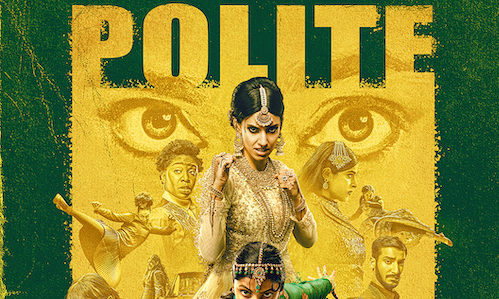
View On WordPress
2 notes
·
View notes
Text
Tim Price’s new play about the life of Aneurin “Nye” Bevan, directed by Rufus Norris and featuring a wonderful central performance by Michael Sheen in the title role, is a fever dream of a production – quite literally. It follows Bevan’s life from his childhood in Wales where he struggles with his stutter to the heights of his political career and the creation of the National Health Service in 1948, each event in his life told in the form of hallucinations from his death bed in one of the hospitals he himself helped to establish. “So nice. Seeing it. Without everyone… standing on ceremony. Isn’t it?” he says to his wife, and fellow politician, Jennie Lee (Sharon Small) on waking from an operation to remove a stomach ulcer.
The operation has not been entirely successful and Bevan requires pain relief that sends him into the strange world where he relives the events that led to his greatest political success in the NHS, with the occupants and staff of the hospital embodying the people of his past. The matron becomes Clementee Atlee (Stephanie Jacob), the nurse becomes his sister Arianwen (Kezrena James), one doctor becomes Neville Chamberlain (Nicholas Khan) and another becomes Winston Churchill (Tony Jayawardena).
The construct does feel strangely unnecessary, though it provides the opportunity for some wonderful stagecraft with the green curtains of the hospital wards becoming the green benches of the House of Commons and hospital beds transforming into council chambers or doorways that open, despite their occupants – and there is something inherently comic in the permanently pyjamaed and barefoot Nye involving himself in council debates, making parliamentary speeches and standing up to the towering Winston Churchill (notably caricatured by Jayawardena) as war rages across Europe.
Sheen, on stage throughout is clearly the star ��� full of passion but with an impish quality to his every interaction, you get the sense of a man filled with desire to do good for the right reasons. He also brings Bevan’s sense of his bewilderment at each hallucinatory interaction, balancing how the past Bevan interacted with the scenario with how the older Bevan is now viewing from the future – no mean feat. Other performances across the large ensemble are constrained by the format, with each actor playing multiple roles and only a couple of characters who exist for more than a handful of scenes.
Price finds himself somewhat caught between telling the story of the man who created the NHS and telling the story of the NHS’s creation. It is very much the former, but in its final act, it feels like it sways towards the latter – swelling with sentimentalism for the sheer seismic political achievement that the NHS was, and is. Many may feel the latter elements should have warranted expansion – there may be merit in that, but it would be a different play, for good or bad. Whatever your view on the play, though, Sheen is worth the visit.
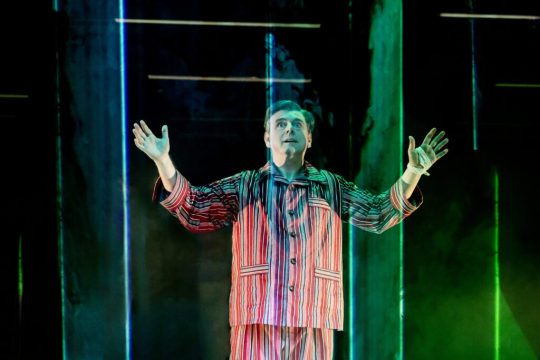

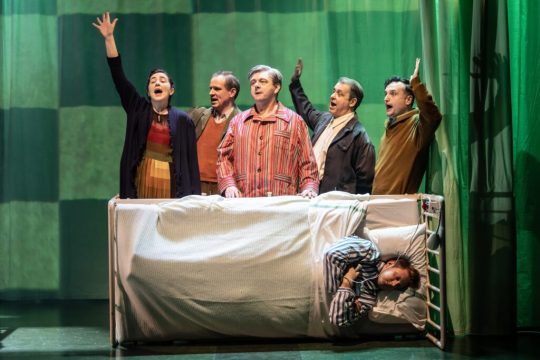
31 notes
·
View notes
Text
THE SUBSTANCE Demi Moore, Dennis Quaid acclaimed horror - now with full trailer
The Substance is a 2024 horror drama film about a fading celebrity who uses a black-market drug to create a younger version of herself.
Written, directed and co-produced by Coralie Fargeat (Revenge, 2017) wrote and directed The Substance. Co-produced by Tim Bevan and Eric Fellner.
The Blacksmith Pictures-Universal Pictures-Working Title Films co-production stars Demi Moore, Margaret Qualley,…
#2024#Coralie Fargeat#Demi Moore#Dennis Quaid#horror drama#Margaret Qualley#movie film#review reviews#The Substance
0 notes
Text
Brief Talk Podcast - Brief Tale featuring Bevan
In this episode, UNB Tim interviews Bevan Taylor, an influencer known for his swimwear and underwear reviews. Bevan shares his journey of body confidence and self-acceptance, as well as his passion for promoting body positivity. They discuss the differences in swimwear culture between Australia and the United States, as well as their favorite brands and styles. They also touch on the challenges…
0 notes